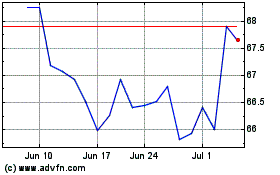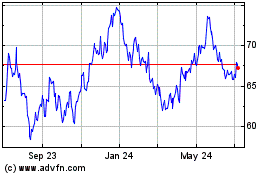Australia's Swan: Global Recovery Patchy, Uncertain
October 11 2010 - 9:30AM
Dow Jones News
Australian Treasurer Wayne Swan said Monday that the global
recovery remains patchy and uncertain, and the challenge facing
policymakers is how to promote sustainable growth in all economies,
not just shift it between countries.
Currency reform is an "important element" on the global agenda,
although not the only issue, Swan said in an address at the New
York Stock Exchange following weekend meetings of the International
Monetary Fund and World Bank in Washington.
Australia, one of few developed economies to side-step a
recession last year because of emerging economy demand for its vast
natural resources, has taken a relaxed approach to the currency
battles roiling markets, even as the Australian dollar tests fresh
post-float highs above 99 U.S. cents.
Policymakers argue the Australian dollar's recent strength is a
reflection of the country's strong economic position, in stark
contrast to other developed nations still grappling with close to
double-digit unemployment, high sovereign debt and an anemic
private sector recovery.
The U.S., European nations and a number of emerging-market
countries, meanwhile, complain that China is deliberately
undervaluing its currency to aid its exporters. To compete, South
Korea, Brazil and other Asian and Latin American nations have taken
measures to beat down the value of their currencies, leading to
fears that these efforts may presage a trade war.
"Our challenge here must be to lift growth, not just shift
growth. That's why we need to work together within the Group of 20
to deliver comprehensive global economic reforms to achieve strong,
sustainable and balanced growth," Swan said.
His remarks come as Chinese central bank officials at the
weekend rejected calls for an international or regional currency
accord and ahead of a meeting of leaders of the G-20 group of
nations next month in Seoul.
Noting that the underlying global imbalances that caused the
recent financial crisis still remain, the Australian treasurer
called on the U.S. to abandon its role as the "consumer of last
resort for the global economy".
If the global recovery is to be balanced, and sustained,
developing nations need to increase their rate of growth in
domestic demand, while developed countries need to increase
domestic savings, Swan said.
Describing the economic re-emergence of Asia as "arguably the
most significant global economic transformation" since the
emergence of the U.S. as a major global economic power, Swan said
Asia's rise should not be feared, or seen as supplanting Europe and
the U.S., "but rather adding another engine of global economic
growth".
The comments are a sign Australia's recently-returned minority
Labor government is eager to shrug off some of the thorny political
spats with Asia, notably China, that plagued its first term in
office. Under previous Prime Minister Kevin Rudd, who was ousted in
a June intraparty coup, Australia locked horns with China over
foreign investment, trade and human rights issues.
"Australia's engagement with Asia has been to our advantage,"
said Swan, who as Treasurer also has oversight over Australia's
foreign investment approvals, adding: "We're a capital-hungry
country with a big investment pipeline."
China recently surpassed Japan as Australia's biggest two-way
trade partner, and Chinese state-owned firms have shown a growing
appetite for investment in Australia's resources sector, although
the U.S. remains the number one foreign investor and third-largest
trade partner.
Turning to a controversial Australian government plan to levy a
new 30% tax on mining company profits, which some smaller miners in
particular fear will stifle investment, Swan said this is "not
borne out in the data," which show a "very strong pipeline of
investment about to get underway".
The tax proposal was vigorously opposed by industry before a
deal was brokered by the big three miners, BHP Billiton Ltd.
(BHP.AU), Rio Tinto PLC (RIO.AU) and Xstrata PLC (XTA.LN) in early
July, lowering the headline rate from 40% and excluding all
minerals except iron ore and coal.
It still faces a tough battle to be passed into law ahead of its
proposed July 2012 start date, however, with the minority
center-left Labor government relying on independent and minor party
lawmakers in both the lower and upper houses of Parliament to pass
any new laws.
-By Rachel Pannett, Dow Jones Newswires; 61-2-6208-0901;
rachel.pannett@dowjones.com
Rio Tinto (NYSE:RIO)
Historical Stock Chart
From Mar 2024 to Apr 2024

Rio Tinto (NYSE:RIO)
Historical Stock Chart
From Apr 2023 to Apr 2024
